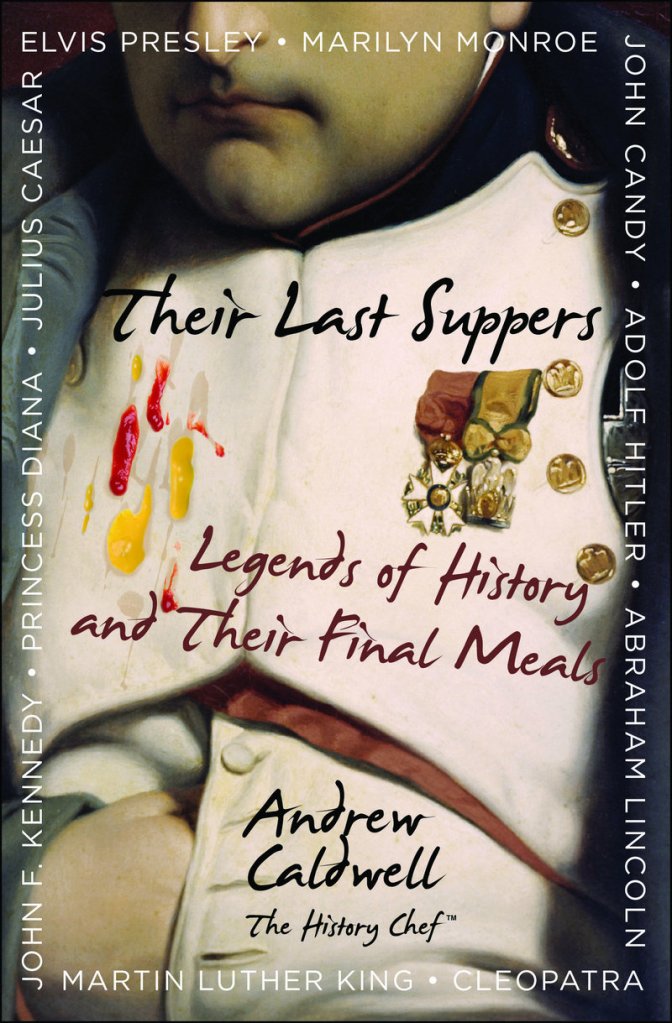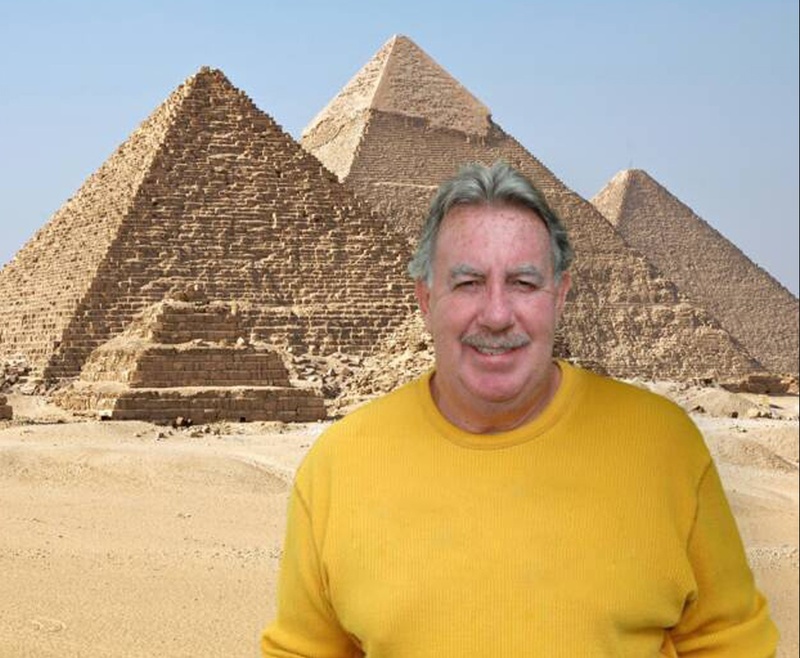Napoleon Bonaparte’s last meal before he met his demise was a rich, hearty breakfast that is nothing if not French: liver and bacon chops, sauteed kidneys in sherry, shirred eggs with cream, and garlic toast with roast tomatoes.
It was served on imperial silver in a farmhouse called Le Caillou.
That’s one of those fun bits of information you occasionally come across in life that you never knew you wanted to know.
Andrew Caldwell has written a book full of tasty anecdotes about historical figures and what they ate just before they died. “Their Last Suppers: Legends of History and Their Final Meals” (Andrews McMeel, $19.99) is a blend of history and culinary research that takes a look at the lives — mostly the deaths — of people from Alexander the Great to Adolf Hitler, then reports what they had for their last meal.
Caldwell, who is also a chef, includes recipes so that readers can replicate the meals at home for a themed dinner party or just for fun.
The 56-year-old author considers Bermuda his home.
“I was put in a monastery school in England when I was really young, and I spent six years there,” he said. “I ran away from school twice before 12. I left school at 12 and a half, and I ended up in the Bahamas on a fishing boat. When I was 15, I started training as a chef in Bermuda. I worked my way through the kitchens from there.”
Cadwell worked in many different parts of Mexico and the Caribbean before he was 21, then moved into hotel management and worked at large resorts.
He has two more volumes of last-meal stories in the works that will include well-known figures such as John Lennon, James Dean, Davy Crockett, Michael Jackson, Jim Morrison and Amelia Earhart.
Q: With a topic like this, I’ll bet you get invited to a lot of cocktail parties.
A: Well, that would be nice if I had the time to go to cocktail parties. Unfortunately, my life is something of a blur.
Q: How do you choose historical figures to write about? Does the history or the food come first?
A: The genius of this book, or the craziness of this book, was that to get in the book, you had to have a set criteria. And that was, you had to be a newspaper headline around the world. So Mama Cass kicking the bucket in California wouldn’t put the French flags on half-mast, but Elvis dying, Diana, Marilyn, Julius Caesar being stabbed in the Senate 2,000 years ago would have been as important an event as Michael Jackson just kicking the bucket.
So you had to be a newspaper headline that affected other countries; you had to do something really silly or stupid. And then you had to have a great last meal, and you can’t die in your sleep. I could have written a huge book about Winston Churchill, but then, he had chicken broth.
What I’ve tried to do, instead of writing the Wikipedia version of the books, I’ve tried to come up with the (historical) truth. Custer was the only man not scalped at Little Big Horn. He had a crewcut three days before. And all this story about this long, long hair flying was something that his wife created. The truth was, three days later, they had a steamship waiting for him, he was going back to Washington, D.C., he was going to run as the Democratic contender for president of the United States. He had more troops killed in the Civil War than any other general. He finished 34 out of 34 at West Point. This was not an American hero; this was a nutcase. And so I try and tell people the real history.
Q: Was this a hobby of yours that became a book?
A: No. I was a head chef for many years, and I was really good at what I did. I haven’t even been to high school, but in the monastery valley that I was brought up in, there was a Norman castle, a Roman fort. Every penny I ever got when I was a kid, I’d go to Guatemala, Mexico. Everybody else goes to spring break; I take a machete and go and hack my way through Guatemala.
My mother got really, really ill and was only given a short time to live. I ran out of money really quickly, because she didn’t have really great insurance. I wrote to 100 publishers and agents. I felt this was a good idea, and I didn’t get one reply. So I published the first book myself and edited it myself and drew the cover myself and found a small printer and started selling books out of the back of my car while I was looking after my mother 24-7. And I started selling a thousand books a week. It just caught on, and here we are today.
Q: How much research do you have to do on the recipes to make sure they’re as original as possible but they still work? Some of the recipes are pretty ancient.
A: The oldest guy in all the books is Tutankamen. They go back 3,000 years. But if you go to the Cairo museum, you see all the stuff that came out of his tomb. It’s stuffed geese, roast legs of lamb, half sides of beef, a red wine with his name on it. Inspectors have a little piece of the lower intestine that was found in his mummy, and they found a pickled red roast beef, two kinds of bread and a nice red wine in there.
The information is out there. The ancients used to put a lot of salt in stuff, but I’m pretty happy with the recipes. They all still work, and they’re really simple. You can go online tonight and find out what Princess Diana had in Paris and stuff, and Elvis’ last meal. I try to tell you things you don’t know. Did you know Elvis was a twin?
Q: Yeah. Actually, I was born and raised in Memphis, so I know a lot about Elvis.
A: There you go. Not everybody does. He was 365 pounds when they took him down the driveway that night.
Q: Most of the people in this book didn’t realize that they were eating their last meal, did they?
A: Only two people did in the whole series — Hitler and Hemingway. They both killed themselves. I mean, what did you just have for lunch?
Q: A salad.
A: There you go. What if that was your last meal? Isn’t that pretty pathetic? Let me guess. You had a very light dressing on that.
Q: No, actually, blue cheese.
A: Hmmm, so you had a salad with blue cheese. If that was your last meal today, you have a brain aneurysm after talking to me, how sad is that? Maybe we could put it on your gravestone: “She really liked blue cheese dressing.” Hopefully when I go out, it will be something like, “He loved that suckling pig.”
Q: I’m sure you’ve been asked this a lot, but if you could choose, what would your own last meal be?
A: I’m trying to work my way through everything on every menu, but I like really simple stuff. Give me a red snapper, wrap it in a banana leaf and stick it on a grill for like 30 minutes. That’s the sort of thing I like.
Q: Marilyn Monroe ordered a Mexican buffet delivered for dinner the night of her death. Do you know for sure that the recipes you included were part of the buffet, or are they just intended to be representative?
A: They were actually in the buffet. Bobby Kennedy was arriving that afternoon. Mexican food was his specialty, that’s what he loved. She only put the buffet on because she was entertaining him. The housekeeper said he was there.
Q: How do you find out, though, the specific dishes?
A: Well, a lot of things out there are written. The Roman emperors were kind of like how Americans are today. Everything was written down. The only ones I’ve got some question marks over are Alexander the Great and Cleopatra in all the books, simply because those guys organized huge banquets for themselves, and so I picked out foods that they reputedly loved and made them part of the banquet. But I wouldn’t know for sure what exactly they put in their mouth.
Let me give you a classical example. Three months after Michael Jackson died, the day after they released the autopsy, he had a woman who was looking after him, Kai Chase. But she actually said that on the last day, his last 24 hours, he had granola and almond milk, and spinach salad and grilled chicken for lunch, and vegetarian chili and tofu for dinner. Everybody’s food somewhere along the line is documented.
Staff Writer Meredith Goad can be contacted at 791-6332 or at:
mgoad@pressherald.com
Copy the Story Link
Send questions/comments to the editors.





Success. Please wait for the page to reload. If the page does not reload within 5 seconds, please refresh the page.
Enter your email and password to access comments.
Hi, to comment on stories you must . This profile is in addition to your subscription and website login.
Already have a commenting profile? .
Invalid username/password.
Please check your email to confirm and complete your registration.
Only subscribers are eligible to post comments. Please subscribe or login first for digital access. Here’s why.
Use the form below to reset your password. When you've submitted your account email, we will send an email with a reset code.